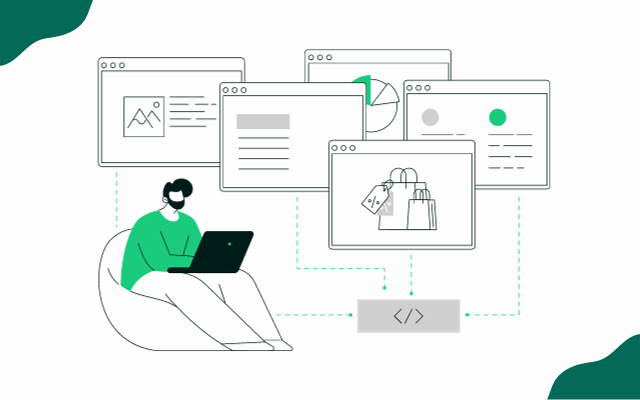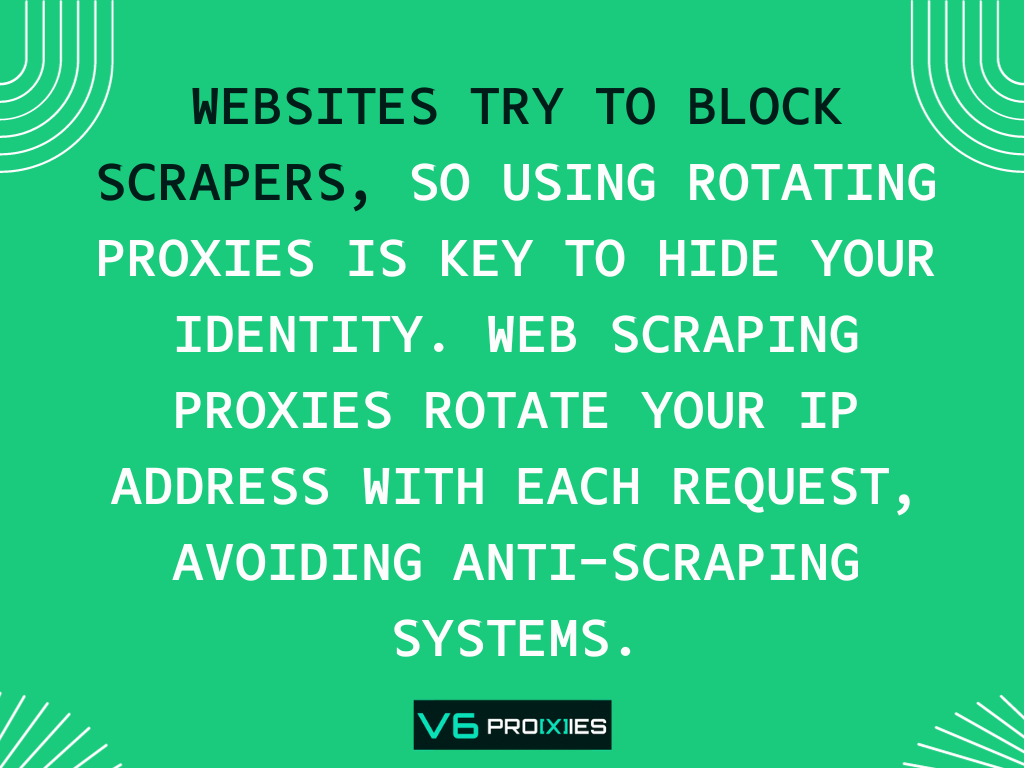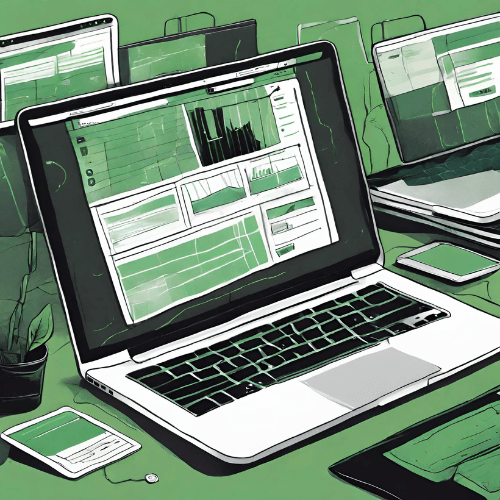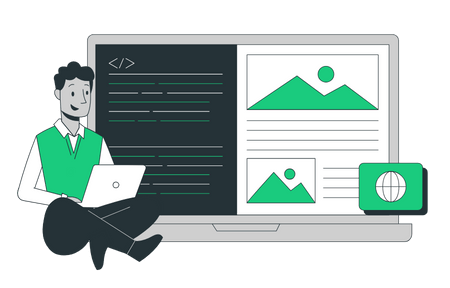Ever stumbled across the term web scraping, and not known what it meant? There’s no need to worry. Web scraping might seem complicated initially, but once you understand it, it’ll become second nature.
Web scraping is so popular that it is used in a variety of fields, from data analysis to competitive intelligence, machine learning, SEO and much more. As you read on in this article, you’ll discover a multitude of use cases that will leave you saying, “Wow, I never knew web scraping could do that!”
Table of Contents
How To Scrape Data From A Website?
Web scraping is the process of automatically extracting data from websites. It works by sending HTTP requests to websites and then analyzing the HTML, XML or JSON response to extract the relevant data. A typical web scraping process usually include these steps:
- Find the URL(s) of the pages you want to scrape. This might be a single page or a list of product/service pages.
- Send an HTTP request to download the page content. Web scraping tools and libraries make this very easy.
- Parse (analyze) the page content to extract the data you need. This usually involves finding HTML elements like table rows or divs that contain the target data. Scrapers use parsers like Regex, XPath or CSS selectors to identify content.
- Format and store the scraped data. The data can be saved to a database, spreadsheet or JSON file for further analysis and use.
- Repeat the process for other pages. Most scrapers work recursively to crawl through links to download and parse multiple pages from a site.
Some key advantages of web scraping include its ability to gather large amounts of data quickly and process unstructured data from websites.
The Tools You Need for Web Scraping
Before you start scraping, you’ll need to pack your toolkit with the right instruments. So what cutting-edge cyber tools do you actually need to scrape the web?
Python Knowledge
Python is the most common language for web scraping due to its simplicity and fantastic libraries like BeautifulSoup and Scrapy. You’ll need familiarity with Python syntax, working with requests, parsing responses, and other scraping needs.
Libraries and Frameworks
Speaking of those, when your Python skills are coupled with powerful libraries like BeautifulSoup, Scrapy, and Selenium, provide mechanisms to download web pages, analyze/parse HTML and extract data.
Web Browser DevTools
You know the ‘Inspect’ option you see when you right-click on a webpage? That’s DevTools – your personal magnifying glass into the website’s structure and you need to know how to use it.
Scraper Extensions
If you’re screaming ‘Hey, I’m no developer!’, cheer up! There are several browser extensions (like Data Miner or Web Scraper) that can give you a helpful hand in your web scraping adventure by automating scraping without writing code.
Rotating Proxies
Websites try to block scrapers, so using rotating proxies is key to hide your identity. Web scraping proxies rotate your IP address with each request, avoiding anti-scraping tools.
Scraping Skills You Need To Learn
Web scraping requires a diverse set of skills to be effective at extracting data from websites. Here are some of the most important abilities to develop:
Understanding HTML Parsing
Learn to analyze and understand the structure of HTML pages. Libraries like BeautifulSoup, lxml and XPath make parsing easier, but you need to know how to target elements, traverse the DOM and handle dynamic content.
To effectively parse HTML, you need to understand how web pages are structured and how different elements are nested within each other.
Mastering CSS Selectors
CSS selectors play a critical role in web scraping. They help you target specific elements on a web page. By understanding CSS selectors, you can efficiently locate and extract data from web pages. Tools like Scrapy and Selenium use CSS selectors to navigate through a web page’s elements, making data extraction more precise and efficient.
Dealing with Javascript
Many sites use Javascript to load content. You’ll need to execute Javascript using libraries like Selenium and Puppeteer to render pages fully.
Using APIs for Web Scraping
Sometimes, websites offer APIs, making web scraping simpler and more efficient. APIs provide structured data, reducing the need for extensive HTML parsing. They are a cleaner, more ethical way of scraping data, as they are often provided by the website for public use. Learning to use APIs can save you time and effort in your web scraping tasks.
Common Challenges in Web Scraping
Web scraping is not without its challenges. Websites often change their layout, which can break your scrapers. Additionally, websites may implement measures to prevent scraping, like using JavaScript to load content. Being aware of these challenges and knowing how to adapt is key to successful web scraping.
Working around Anti-Scraping Measures
Websites may employ anti-scraping measures like rate limiting or using complex JavaScript to deter scrapers. To work around these, you might need advanced techniques like using headless browsers, rotating proxies, or simulating human-like interactions using tools like Selenium.
Dealing with CAPTCHAs and IP Blocking
CAPTCHAs and IP blocks are common tools websites use to stop scrapers. Overcoming CAPTCHAs can be challenging, requiring techniques like using CAPTCHA solving services or AI models. IP blocking can be circumvented by using proxies to rotate your IP address, making it harder for websites to track and block your scraping attempts.
Use Cases for Web Scraping
Data Extraction for Market Research
Companies scrape data from websites to gather information on market trends, consumer behavior, and competitor strategies. This process aids in creating comprehensive market analyses, driving data-driven decision-making.
Example: A beverage company scrapes data from online retailers and forums to analyze consumer preferences for different drink flavors and packaging types, influencing their product development and marketing strategies.
SEO Monitoring and Analysis
Web scraping helps in tracking keyword rankings, backlinks, and website traffic, essential for SEO strategies. This enables real-time monitoring of SEO performance and competitor analysis.
Example: An SEO agency scrapes search engine results for specific keywords related to their client’s business, tracking changes in rankings and optimizing their client’s website accordingly.
Lead Generation
Businesses use web scraping to collect contact information from various sources, generating potential leads for sales and marketing teams. This method enhances targeted outreach efforts.
Example: A B2B software provider scrapes LinkedIn and industry forums to gather contact information of potential leads who are discussing relevant industry challenges, enabling targeted sales outreach.
Price Comparison and Monitoring
E-commerce platforms and retailers scrape competitor websites to compare prices, adjust their pricing strategies, and remain competitive. This practice is crucial in dynamic pricing models.
Example: An online electronics retailer scrapes prices of gadgets from competitors’ websites daily, using this data to adjust their prices to remain competitive and attract price-sensitive customers.
Social Media Analysis
Scraping social media platforms provides insights into public sentiment, trends, and consumer feedback. This is valuable for brand monitoring and marketing strategies.
Example: A fashion brand scrapes Instagram for mentions of their brand and products, analyzing sentiment and feedback to guide their marketing and product design.
Real Estate Data Aggregation
Web scraping gathers data from real estate websites for market analysis, price trends, and investment opportunities. It aids in identifying profitable real estate ventures.
Example: A real estate investment firm scrapes listings from multiple real estate websites to analyze market trends, property prices, and rental yields in different regions for investment decisions.
Academic Research
Researchers scrape data from various online sources for academic studies, trend analysis, and data visualization. This enhances the depth and scope of research.
Example: A university research team scrapes online news articles and public forums over several years to study the evolution of public opinion on climate change.
Product Development Insights
Companies scrape user reviews and feedback from various platforms to improve their products or develop new ones. This user-centric approach helps tailor products to meet market demands.
Example: A consumer electronics company scrapes online reviews of their products from e-commerce sites to identify common issues and feature requests, informing their product improvement and innovation pipeline.
FAQs and Answers
What is the difference between web scraping and data mining?
Web scraping extracts data from websites, while data mining analyzes and processes that data to discover patterns, relationships and insights. Scraping gets the raw data, mining makes sense of it.
What is the difference between web scraping and web crawling?
Web crawling automatically follows links to index entire websites. Web scraping targets specific data within web pages. Crawlers find pages, scrapers extract data from those pages.
Can you web scrape instagram?
Instagram has anti-scraping measures in place and may ban accounts that scrape data. However, it’s technically possible and we have a special solution for scraping and automating Instagram via proxies.
Can you get in trouble for web scraping?
No, there are no legal issues, but if done without respecting a website’s Terms of Service, you risk being blocked or banned. The solution to avoid this is using rotating proxies.
How to make money with web scraping?
Scraped data can be monetized in many ways – building marketing leads lists, price comparison sites, news aggregators, and more. But commercial use requires awareness of legalities.
Does amazon allow web scraping?
Amazon’s ToS prohibits scraping their site for commercial use. But you can bypass these restrictions through V6proxies Amazon solutions.
Is web scraping difficult?
Web scraping can have a moderate learning curve. It requires knowledge of languages like Python and skills like parsing HTML and dealing with dynamic websites.
For simple scraping tasks, browser extensions provide a GUI that is easier for non-developers. But large scale, complex scraping still requires coding expertise.
With practice over time, the process gets easier. There are also managed services that can scrape sites through an API without needing to code the scrapers.
Related articles:
- The Difference Between Screen Scraping and Web Scraping
- Best 5 Proxies For Web Scraping (Top Providers)
- Best LinkedIn scrapping tools.
- How to Scrape Google Search Results: Tools & Strategies
- What Data Can You Actually Scrape from WhatsApp?
- Scraping Instagram Data (Followers, Profiles & Hashtags)
- What Is MAP Monitoring? [Track Your Pricing Compliance]
- What Is IP Rate Limiting? An In-Depth Guide (2024)
- How To Make Money With Web Scraping? (10+ Examples) (2024)
- How Websites Prevent Web Scraping? [Anti-Scraping Tools]
- Tags:
- python, web scraping








